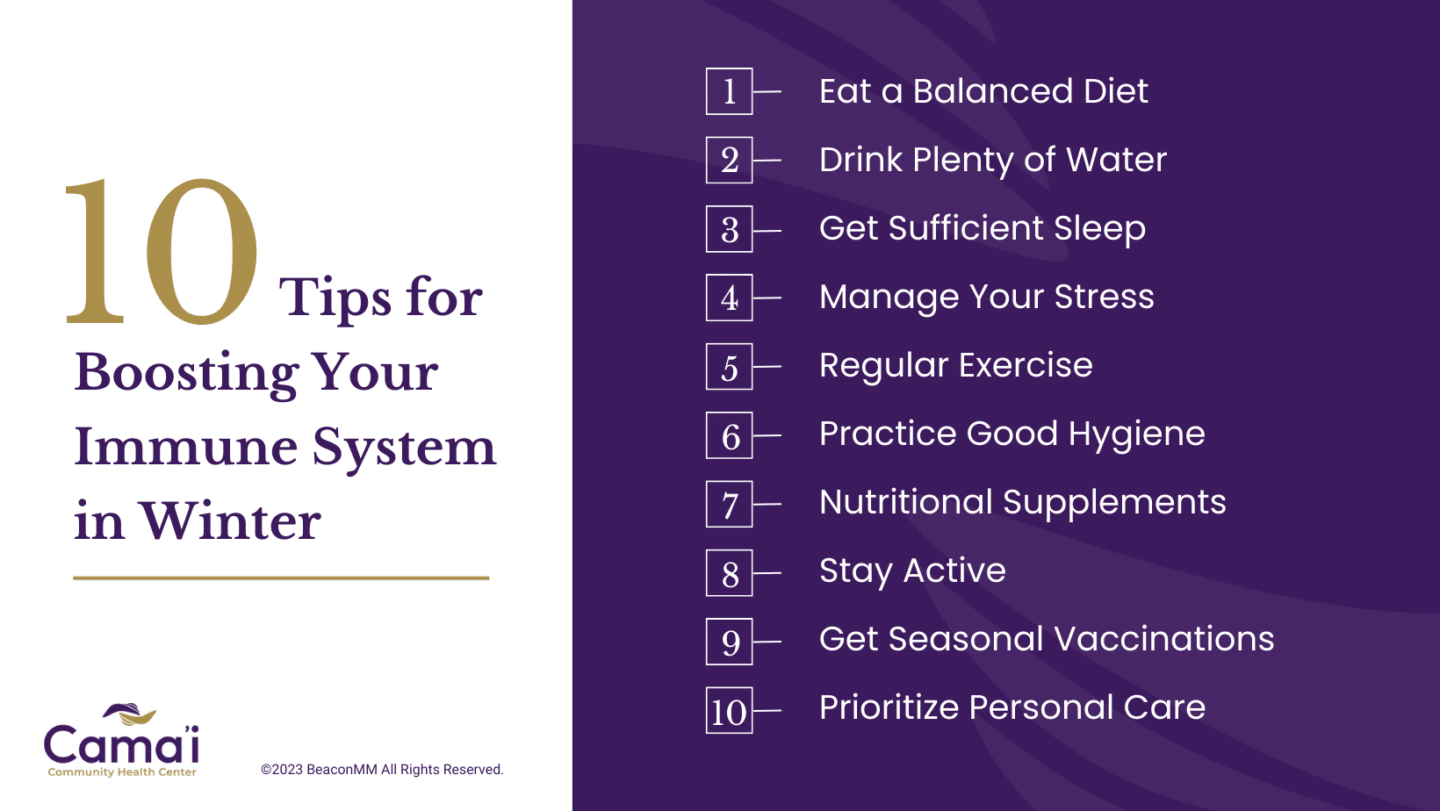Here in Alaska, we’re known for our breathtaking landscapes and extreme weather conditions — and this typically offers a unique winter experience unlike any other. However, with the beauty of this season also comes the challenge of maintaining good health.
The harsh weather and reduced daylight hours can put a strain on our immune systems, making it essential to prioritize immune health.
Let’s explore the importance of maintaining a healthy immune system during an Alaskan winter and some strategies to achieve it.
Do you need to get your flu shot? Reach out to Cama’i Community Health Center today to schedule an appointment.
Combatting Seasonal Challenges
The Alaskan winter brings frigid temperatures, limited daylight, and increased indoor time. These factors can weaken our immune systems, making us more susceptible to cold and flu viruses and other respiratory illnesses. Strengthening our immune defenses becomes crucial for fending off these seasonal challenges.
- Boosting Immunity Through Nutrition: Consuming a nutrient-rich diet is fundamental for a robust immune system. In Alaska, where fresh produce might be limited during winter, focus on incorporating foods rich in vitamins C, D, and zinc. Consider root vegetables, canned fruits/veggies, fatty fish, nuts, and seeds to ensure a well-rounded intake of essential nutrients to nourish your immune cells.
- Maximizing Sunlight Exposure: With shorter daylight hours, Alaskans often experience reduced exposure to sunlight during winter. Sunlight is vital for the body’s production of vitamin D, which plays a significant role in immune function and healthy white blood cells. Whenever possible, try to spend time outdoors during daylight hours or consider vitamin D supplements after consulting with a healthcare professional.
Signs of an Unhealthy Immune System
Our immune system serves as a powerful defense mechanism, shielding our bodies from harmful invaders such as viruses, bacteria, the common cold, and other pathogens. A well-functioning immune system is crucial for overall health. However, sometimes our immune system can falter, leaving us susceptible to illnesses. Recognizing signs of an unhealthy immune system is key to addressing potential issues early on.
Here are some indicators that your immune system might not be functioning optimally:
- Frequent Infections: If you find yourself catching colds, flu, or other infections frequently, it could be a sign of a weakened immune system. Recurrent infections or having a harder time recovering from illnesses might indicate an immune system struggling to combat pathogens effectively.
- Slow Healing: Delayed wound healing or persistent sores might suggest a compromised immune response. A healthy immune system works efficiently to repair damaged tissues and fight off infections, leading to quicker healing times.
- Fatigue and Low Energy: Persistent fatigue or feeling constantly run down could be a sign of an overactive or weakened immune system. Your body might be diverting energy to battle perceived threats, leaving you feeling exhausted.
- Allergies and Sensitivities: Heightened allergic reactions or an increase in sensitivities to certain foods, substances, or environmental factors could indicate immune system dysfunction. An immune system that’s too reactive might result in allergies or intolerances.
- Inflammation and Chronic Pain: Persistent inflammation or chronic pain without an apparent cause might signal an immune system imbalance. Inflammation is a normal immune response, but chronic inflammation can indicate an underlying issue.
- Digestive Problems: Issues such as frequent stomach upset, diarrhea, or other gastrointestinal problems might be linked to immune system imbalances, especially related to gut health. The gut houses a significant portion of the immune system.
- Autoimmune Conditions: Autoimmune diseases occur when the immune system mistakenly attacks healthy cells and tissues. Symptoms can vary widely depending on the specific condition but may include fatigue, joint pain, skin rashes, and other systemic issues.
- Unexplained Weight Changes: Sudden or unexplained weight loss or gain can sometimes be associated with immune system disorders, especially if accompanied by other symptoms.
- Recurrent Infections in Specific Areas: If you have recurring infections in specific areas, such as urinary tract infections or skin infections, it might indicate a localized immune deficiency.
If you notice any of these signs persisting or occurring frequently, it’s essential to consult a healthcare professional for proper evaluation and guidance. They can conduct tests, assess your medical history, and recommend appropriate steps to address any underlying issues affecting your immune health.
Tips to Boost Your Immune System During Winter

As the winter season approaches, staying healthy in rural Alaska becomes a top priority. The colder months often bring with them a higher susceptibility to illnesses like the flu, colds, and other infections. Strengthening your immune system is crucial to help ward off these seasonal bugs and keep you feeling your best.
Here are some effective strategies to boost your immune system during the winter months:
- Maintain a Balanced Diet: A healthy, balanced diet is key to supporting your immune system. Include a variety of fruits, vegetables, lean proteins, whole grains, and healthy fats in your meals. Foods rich in vitamins C and D, as well as zinc, can be particularly beneficial for immune function.
- Stay Hydrated: Don’t forget to drink plenty of water throughout the day. Proper hydration is essential for overall health and helps your body function optimally, including supporting your immune system’s defenses against pathogens.
- Get Sufficient Sleep: Aim for 7-9 hours of quality sleep each night. When you get enough sleep, your body repairs and rejuvenates itself, which is crucial for a robust immune response. Establish a bedtime routine and create a sleep-conducive environment to improve the quality of your rest.
- Manage Stress: Chronic stress can weaken your immune system. Practice stress-relieving techniques such as meditation, yoga, deep breathing exercises, or engaging in hobbies that bring you joy and relaxation.
- Exercise Regularly: Moderate exercise can enhance immune function and reduce the risk of infections. Aim for at least 30 minutes of physical activity most days of the week. It can be as simple as taking a brisk walk, cycling, or practicing yoga.
- Practice Good Hygiene: Wash your hands frequently with soap and water, especially before eating and after being in public places. Use hand sanitizers when soap and water are not available. Additionally, cover your mouth and nose when coughing or sneezing to prevent the spread of germs.
- Consider Supplements: If your diet lacks certain nutrients, consider taking supplements after consulting with healthcare services. Vitamin C, vitamin D, zinc, and probiotics are some supplements that may support immune health.
- Stay Active and Engaged: Maintain social connections and stay active in your community. Social interaction and a sense of belonging contribute positively to overall well-being, which indirectly supports a healthy immune system.
- Consider Seasonal Vaccinations: Consult with your healthcare provider about getting vaccinated against the flu and other relevant vaccines recommended for the season.
- Prioritize Personal Care: Listen to your body and prioritize self-care. Rest when you feel tired, and don’t hesitate to seek medical advice if you’re feeling unwell.
Remember, these strategies work together to support your immune system. Incorporating them into your daily routine can help fortify your body’s natural defenses — and reduce the risk of falling ill during the winter months.
If you have specific health concerns or conditions, it’s always best to consult with a healthcare professional for personalized advice and guidance. At Cama’i, we want you to stay healthy and embrace the winter season with vitality!
Keep Your Immune System Strong at Cama’i Community Health Center
Remember, winter is the peak time for cold and flu season. And if you’ve begun experiencing any symptoms, or if you’re concerned about outbreaks in your area, it’s important to reach out for treatment or contact us to schedule flu vaccines.
At Cama’i Community Health Center, we have primary care personnel who are committed to serving residents in our remote community, no matter what type of illness you’re suffering from. As Alaskans, we fully understand how our remote regions can prevent you from getting care.
For patients living in rural Alaska, when you come to Cama’i for your healthcare needs, you’ll receive the best care and treatment we can offer. Together, we can help keep you healthy year-round.
Are you or your loved ones in need of primary care services? Contact Cama’i Community Health Center today and schedule an appointment.


